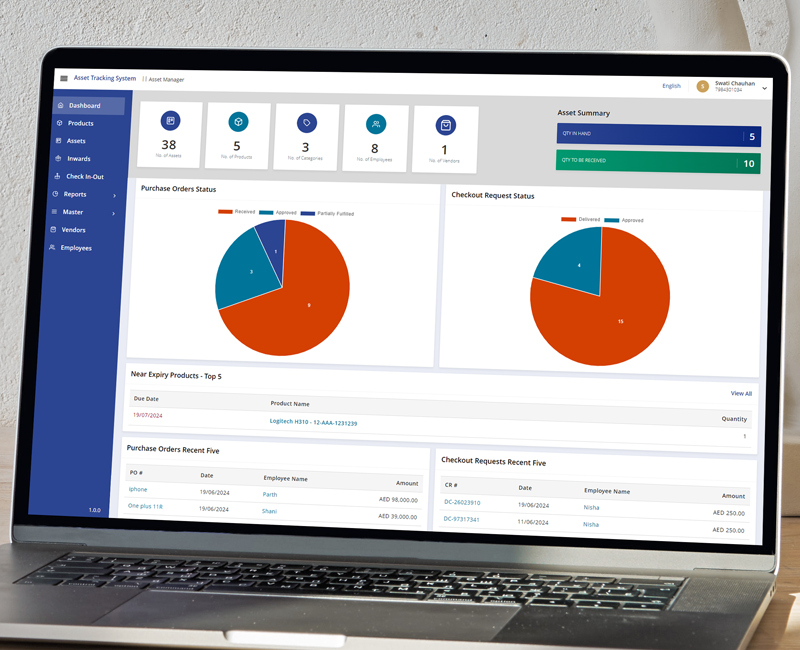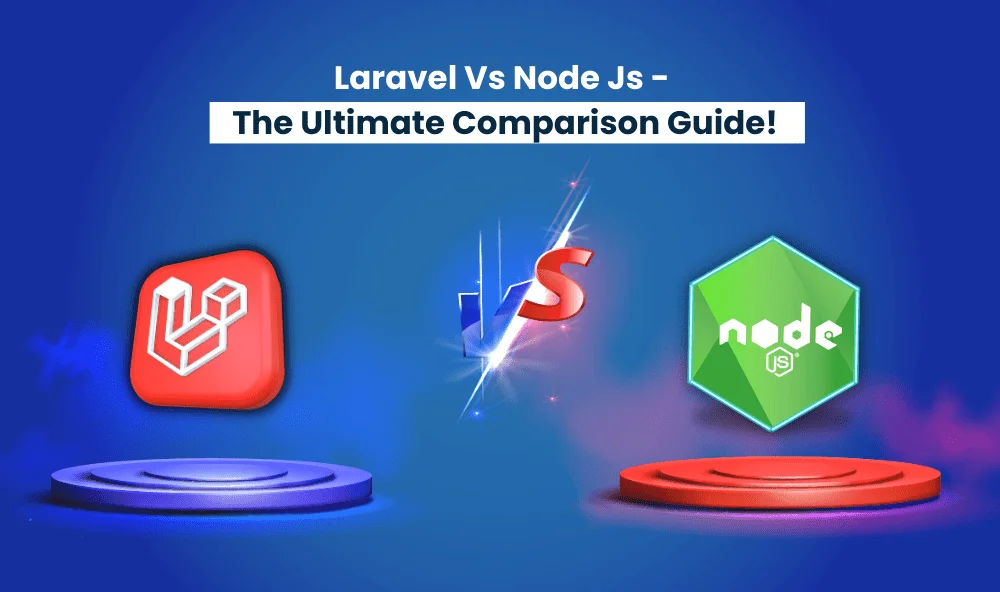
You have a fantastic web app concept and can't wait to get started. You've done all of your research, from industry and competitor analysis to layout and usability strategy.
The following stage will be to begin the streamlined development process. However, as soon as you enter the development stage, you must complete another difficult task.
The challenging task is which backend framework should be used for this project?” Your web app's success will unquestionably be influenced by what takes place in the back end.
When it comes to choosing the best backend framework for your requirements - Laravel and Node Js are the top which cross our minds.
If you are also wondering whether to choose the right one between these two amazing frameworks, then we will be explaining everything here which will help you decide on the right framework.
Considering your business requirements and the use cases - you can choose the ideal one.
So let’s get started and find out which of these two frameworks will go well with your priorities.
The basics of Laravel & Nodejs!
What is Laravel?
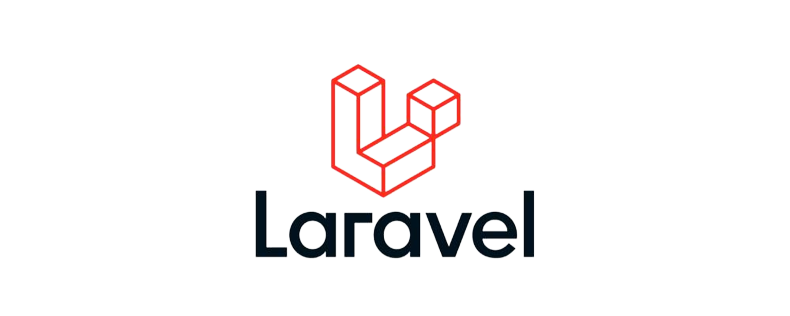
Laravel is a well-known PHP framework for creating web applications that adhere to the model-view-controller (MVC) architectural paradigm and are extremely scalable.
Due to its extensive ecosystem, which makes use of Laravel's inherent powers as well as numerous compatible packages and extensions, when you hire laravel developers, they can use it to speed up the laravel development process. Developers can use Laravel to combine elements from other frameworks, including Ruby on Rails, Yii, and CodeIgniter.
Laravel was created from the bottom up with just two objectives in mind: elegance and simplicity.
Laravel accelerates web development with significantly improved functionalities. If you are familiar with both core PHP and advanced PHP, working with it is simple. In addition, Laravel provides excellent security for websites and guards against cyberattacks.
Pros & Cons of Laravel!
| Pros | Cons |
|---|---|
| Wide range of tools and libraries | PHP environment is necessary |
| Variety of Built-in features for seamless development | Steeper learning curve for new developers. |
| Robust ecosystem and active community support. | High dependency on the PHP ecosystem. |
| Faster development cycle | Upgrading to newer Laravel versions is (sometimes) tough. |
| Elegant syntax and conventions | Limited scalability for high-concurrency apps. |
What is Nodejs?

Node.js is a runtime for JavaScript that is used to create server-side and networking applications. It is intended to function on Google Chrome's built-in V8 JavaScript engine. JavaScript may be used on both the client and server sides to create quick and flexible network applications using Node.js.
The development of real-time web apps is made simpler when you hire Nodejs developers due to its event-driven design. It is perfect for data-intensive real-time applications that run across dispersed devices because it uses an event loop and non-blocking I/O to manage several requests at once.
Node.js can be used to create web servers. Additionally, it may be used to create any other type of network application, such as desktop and mobile ones.
Pros & Cons of Nodejs
| Pros | Cons |
|---|---|
| Better scalability and performance. | Not ideal for CPU-intensive tasks. |
| Extensive ecosystem of JavaScript libraries and tools. | Requires familiarity with JavaScript |
| Single development language | Lack of built-in support for relational databases |
| Code reusability | Less mature compared to some other established frameworks. |
| Active and supportive community. | Potential security concerns |
| Long-term support and stability. |
Laravel Vs Nodejs - The Major Differences!
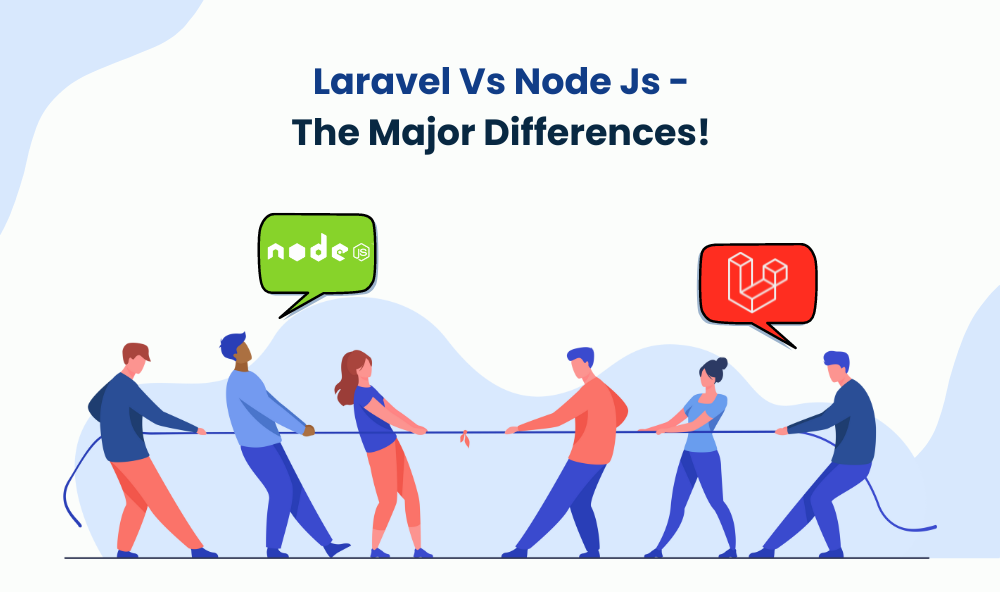
Laravel Vs Nodejs - Learning Curve
Laravel
The learning curve for Laravel is said to be very steep. You need to be familiar with HTML and CSS programming as well as PHP in order to complete the Laravel learning process.
You must become familiar with Laravel's code structure and other aspects if you wish to work with it. Nevertheless, knowing the framework and the PHP programming language shouldn't be challenging given the greatest Laravel tools and thorough documentation.
Nodejs
If you are familiar with JavaScript, Nodejs is simple to understand. Understanding Node's architecture, which is based on JavaScript and npm package modules, is also necessary. Starting with a Node demonstration project will help you learn architecture and module installation.
If you are familiar with JavaScript, you may begin developing with Node right away.
RELATED: Difference Between Nodejs and Php
Laravel Vs Nodejs - Ease of Scaling
Laravel
Well-known apps that have been utilizing Laravel for years can scale up their applications without any restrictions. Laravel passes on scalability from PHP environments in order to support quickly growing businesses. Laravel may accomplish significant horizontal scaling by using an effective load balancer and database layout.
Laravel apps can grow flexibly to meet demand by using MySQL, and AWS as necessary, and employing cutting-edge caching techniques.
Nodejs
Node.js can create apps that are extremely scalable. The event-driven, non-blocking I/O architecture handles numerous concurrent requests easily. The event-loop approach also allows the server to handle the most queries possible.
Node.js also has the best fit with microservices archictecture because it divides apps into smaller sections. As a result, it is effective to divide up responsibilities across many Nodejs development teams, allowing for the more rapid and scalable creation of applications.
Laravel Vs Nodejs - Database support
Both Node.js and Laravel accept a wide selection of databases, including relational and NoSQL databases.
Laravel
The Eloquent ORM in Laravel offers built-in support for relational databases. Eloquent offers a straightforward, natural syntax for carrying out typical operations while making it simple to deal with databases. Laravel also includes built-in support for MongoDB and other NoSQL databases, which allows it to support a wide range of NoSQL databases.
Nodejs
Through modules like "MySQL" and "mssql" and others for various databases, Node.js offers native support for relational databases. Additionally, it has a number of ORMs (Object-Relational Mapping) that provide a more advanced user interface for working with databases. It makes it simple for Nodejs developers to communicate with databases and carry out routine operations like data querying, insertion, and updating.
Laravel Vs Nodejs - Robust Testing

Web app development encompasses far more than just creating apps. To ensure that the software satisfies the necessary UI standards, compatibility, and usability, it must pass a number of tests.
Laravel
Laravel includes a variety of testing resources and tools. These tools are offered to guarantee that the application is thorough and error-free. It executes tests in two phases—unit and feature—to make testing more manageable. It offers a variety of tools to test the apps at every step and has strong documentation for testing.
Nodejs
Nodejs, on the other hand, provide debugging capabilities and competitive testing methodologies, including many automated testing tools such as Jasmine, Jest, Lab, Code, Mocha, and AVA, and it also develops a robust testing environment for applications.
Laravel Vs Nodejs - Security
Laravel
Laravel has various security features, such as encryption and hashing routines utilizing the Bcrypt Hashing Algorithm, as well as protection against cross-site scripting (XSS) and SQL injection threats.
It even has integrated support for security best practices like salting and password hashing. Additionally, Laravel has functions that can be used to secure user accounts, like password resets and email confirmation.
Nodejs
Node.js is secure as well, although the security of a Node.js application is strongly dependent on the written code as well as the modules and packages utilized. Using a package with known security vulnerabilities, for example, can jeopardize the security of a Node.js application.
Furthermore, due to its event-driven architecture, Node.js may be more susceptible to attacks that take advantage of the event loop, such as DoS assaults and other forms of attacks.
Laravel Vs Nodejs - Performance
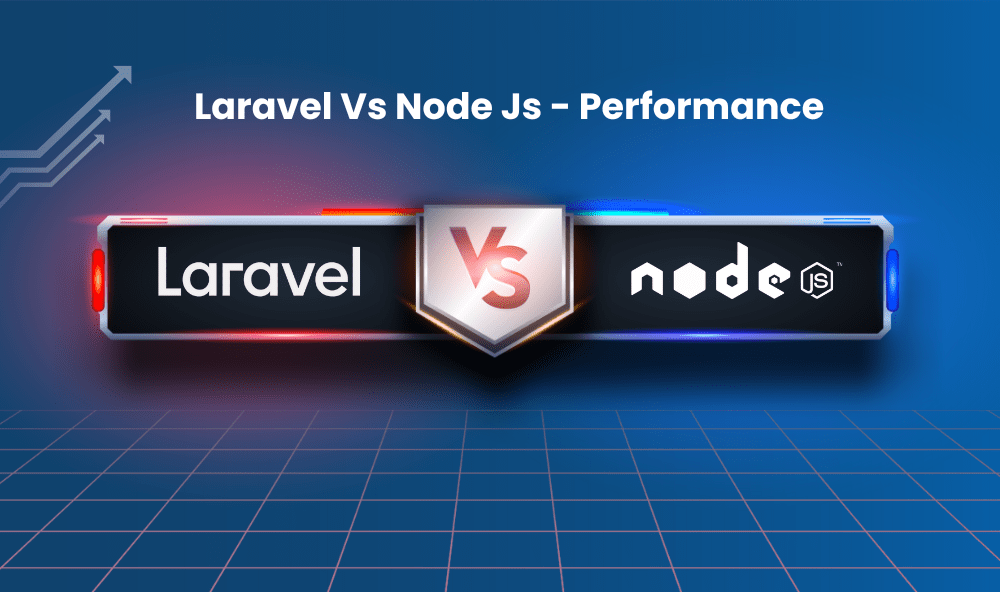
As we all know, one of the most important factors determining the success of your application is performance. So, choosing the ideal one based on your requirements and performance is quite crucial. To get top-notch Laravel or Nodejs performance, don’t forget to hire dedicated developers who understand your needs and offer solutions accordingly.
Laravel
Although Laravel has a rigorous architecture that can manage even big computational-based projects, it excels at security and database interfaces. There are several Laravel libraries that support high-quality, time-effective Laravel development, improving the performance of Laravel apps.
Nodejs
Node.js has an advantage over other frameworks in terms of performance thanks to its architecture. Since queries don't need to wait for outside requests, the time it takes to process requests is slightly decreased.
When it comes to web development, choosing a Nodejs development service can help you create an app that runs well under a variety of challenging scenarios.
When Should You Use Laravel?
Here are a few scenarios where using Laravel is recommended:
- Creating a microservices-supporting application.
- Developing business-level applications
- Building a CRM or other content-focused systems with numerous database
- Tables for backend database management.
- Creating scalable products.
- Creating advanced security applications.
- Utilizing templates to produce pre-built apps.
Here are several scenarios when using Node.js is recommended:
- When you hire laravel developers for real-time applications because they analyze data rapidly and provide consumers with a quick response.
- Developing data-intensive apps such as Netflix, PayPal, and others.
- Developing Live applications.
- Developing chatbots
- Useful for scraping the web and automating tasks.
- Developing rest APIs
To conclude!
In conclusion, we have explained everything you need to know about Laravel vs Nodejs - right from the basics of these two incredible platforms, followed by the major differences and when to choose which one as per your personalized requirements.
Ultimately, both Node.js and Laravel are powerful frameworks with their own unique strengths and use cases.
It's essential to evaluate your project's specific requirements, consider the technical expertise of your team, and choose the framework that best aligns with your goals. By understanding the differences and capabilities of each framework, you can make an informed decision and ensure the success of your web app.
However, if you are still confused and want some guidance to develop a user-friendly web app for your target market, then you can reach out to our team of Laravel and Nodejs developers at Sufalam Technologies. They will understand your customized requirements and offer guidance along with Nodejs and Laravel development services.
Frequently Asked Questions
Which is better: NodeJS or Laravel?
Determining the right framework between Laravel and Nodejs is based on your specific business requirements as both frameworks have their own strengths and use cases. If you need a highly scalable and performance-oriented application, then Node.js is the better choice. On the other hand, if you prioritize developer productivity, code simplicity, and a robust ecosystem of tools and libraries, Laravel may be the preferred option.
Why do we use NodeJS instead of Laravel?
Here are some favorable scenarios when you should opt for Nodejs instead of Laravel –
Node.js offers high scalability for handling concurrent connections efficiently.
Node.js provides excellent performance, especially for I/O-bound operations.
It is well-suited for real-time applications and APIs.
It is usually suitable for microservices architecture and service-oriented applications.







